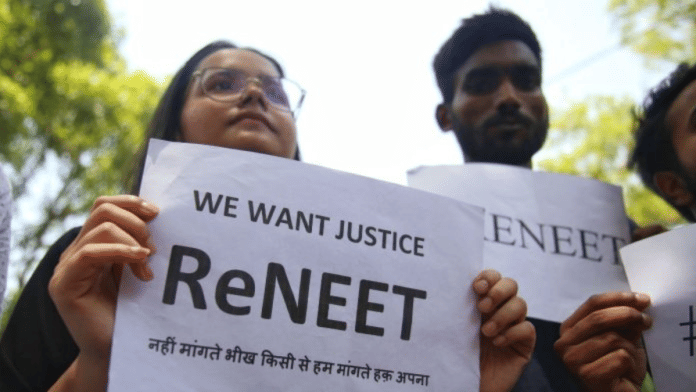Thank you dear subscribers, we are overwhelmed with your response.
Your Turn is a unique section from ThePrint featuring points of view from its subscribers. If you are a subscriber, have a point of view, please send it to us. If not, do subscribe here: https://theprint.in/subscribe/
For decades, the specter of cheating has loomed large over India’s public examination system. From coveted entrance exams like NEET and NET to crucial recruitment processes for government jobs, the shadow of paper leaks and organized cheating networks has cast a shadow of doubt on the very foundation of meritocracy. Finally, with the introduction of the Public Examinations (Prevention of Unfair Means) Act, 2024, a much-needed step has been taken towards ensuring a level playing field for all aspirants. The Act’s significance lies in its targeted approach. It specifically addresses the issue of leaks and unauthorized access to confidential exam information. By classifying such offenses as cognizable, non-bailable, and non-compoundable, it aims to deter organized crime networks that profit from manipulating the system. Stringent penalties, including imprisonment, are a powerful deterrent and a message that cheating will no longer be tolerated. This not only protects the integrity of the exams but also fosters a culture of hard work and honest effort.
Furthermore, the Act empowers authorities to conduct surprise inspections of exam centers and hold examination bodies accountable for lapses in security. This increases vigilance and discourages complacency, ensuring that the sanctity of the examination process is upheld. This also sends a strong message to institutions that may have turned a blind eye to cheating in the past. However, the Act is not without its limitations. Some argue that the current scope, encompassing only centrally conducted examinations, leaves state-level exams vulnerable. This creates a disparity in the system, and extending the Act’s reach to state boards would be a crucial step towards comprehensive reform. Additionally, concerns have been raised about the potential misuse of the Act to penalize inadvertent errors. Striking a balance between stringent enforcement and ensuring a fair chance for genuine students is essential.
The success of the Act hinges on its effective implementation. States must be encouraged to adopt similar legislation, ensuring uniformity across the examination landscape. Robust mechanisms for investigation and swift prosecution of offenders are critical. Additionally, public awareness campaigns are necessary to educate students and the wider community about the seriousness of cheating and the consequences associated with it. The Public Examinations (Prevention of Unfair Means) Act, 2024, marks a significant step towards restoring faith in India’s public examination system. While challenges remain, the Act’s potential to create a fairer and more meritocratic environment for all aspirants is undeniable. By working together, stakeholders – the government, examination bodies, and the public – can ensure that this legislation ushers in a new era of integrity and opportunity in Indian education. The Act’s impact on students themself shouldn’t be overlooked. The constant fear of being caught cheating can create undue stress and anxiety. Promoting a culture of academic honesty requires a shift in focus. Instead of solely emphasizing punishments, the emphasis should be on creating a supportive learning environment where students feel empowered to seek help, clarify doubts, and learn from mistakes.
This might involve revamping pedagogy towards more interactive and engaging teaching methods. Additionally, establishing robust grievance redressal mechanisms for students who suspect unfair practices can create a sense of trust and accountability. The Public Examinations (Prevention of Unfair Means) Act, 2024, is a step in the right direction. However, it’s a marathon, not a sprint. Effective implementation, continuous improvement, and a multi-pronged approach that addresses both the immediate problem and the underlying issues are vital for ensuring a truly fair and credible examination system. Ultimately, the Act’s success will be measured by the creation of a system that rewards genuine merit, fosters a love for learning, and empowers students to reach their full potential.
These pieces are being published as they have been received – they have not been edited/fact-checked by ThePrint.


